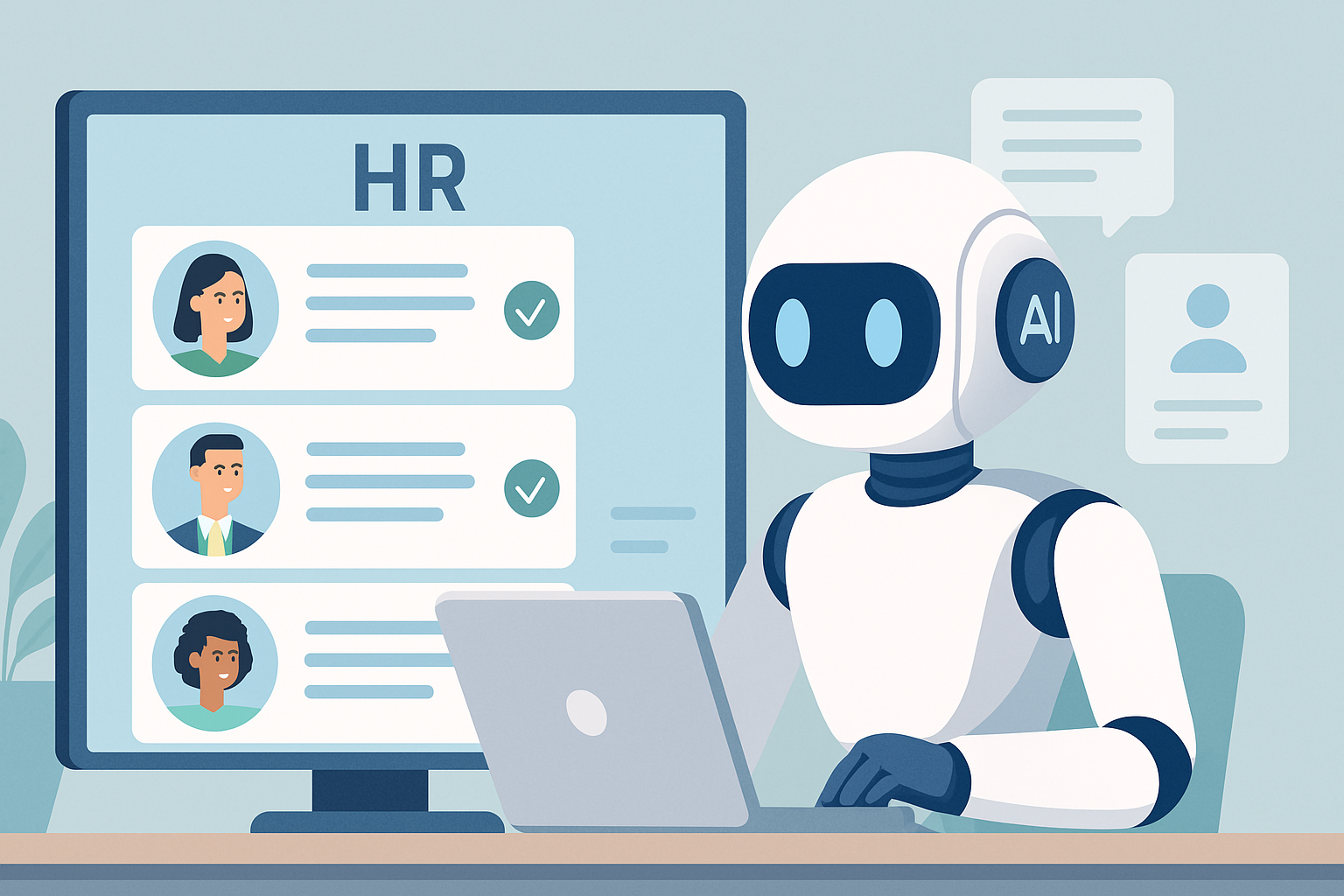Article 15: AI in Human Resources: Streamlining Recruitment, Onboarding, and Employee Engagement
Meta Title: AI in HR (2025): Recruitment, Onboarding & Engagement Tools
Meta Description: Discover how AI is transforming Human Resources with automated recruitment, personalized onboarding, and data-driven employee engagement strategies. Explore top AI HR tools for 2025.
Target Keywords: AI in HR, AI recruitment tools, AI onboarding, AI employee engagement, HR technology
The AI-Powered HR Department: Revolutionizing Recruitment, Onboarding, and Engagement in 2025
The Human Resources (HR) landscape is undergoing a significant transformation, driven by the integration of Artificial Intelligence. In 2025, AI is no longer just a futuristic concept for HR professionals but a practical set of tools that streamline processes, enhance decision-making, and improve the overall employee experience. From identifying the best candidates and personalizing onboarding to fostering engagement and predicting attrition, AI is empowering HR departments to be more strategic and efficient.

How AI is Reshaping Human Resources
- Automated and Intelligent Recruitment:
- Functionality: AI algorithms can scan and analyze thousands of resumes in minutes, identifying the most suitable candidates based on predefined criteria and even predicting future job performance. AI-powered chatbots can handle initial candidate screening, answer frequently asked questions, and schedule interviews.
- Impact: Significantly reduces time-to-hire, minimizes unconscious bias in initial screening, improves the quality of candidates shortlisted, and allows HR professionals to focus on more strategic aspects of recruitment.
- Personalized Onboarding Experiences:
- Functionality: AI can create tailored onboarding plans for new hires, providing them with relevant information, training modules, and introductions based on their role, department, and existing skills. AI-powered virtual mentors can guide new employees through their initial weeks.
- Impact: Improves new hire engagement, accelerates their integration into the company culture, and boosts early productivity.
- Enhanced Employee Engagement and Sentiment Analysis:
- Functionality: AI tools can analyze employee feedback from surveys, internal communications, and even public social media (with consent and ethical considerations) to gauge overall sentiment, identify areas of dissatisfaction, and predict potential disengagement.
- Impact: Allows HR to proactively address concerns, improve workplace culture, and implement targeted initiatives to boost morale and retention.
- Data-Driven Performance Management:
- Functionality: AI can help track employee performance against key metrics, identify skill gaps, and suggest personalized development plans. It can also help in providing more objective and data-backed performance reviews.
- Impact: Leads to fairer performance evaluations, identifies opportunities for employee growth, and helps align individual performance with organizational goals.
- Predictive Analytics for Talent Management & Attrition:
- Functionality: By analyzing historical employee data, AI can identify factors that contribute to employee turnover and predict which employees are at a higher risk of leaving. This allows HR to intervene proactively with retention strategies.
- Impact: Reduces employee churn, saves on recruitment and training costs, and helps retain valuable talent.
- Automated HR Administrative Tasks:
- Functionality: AI can automate many routine HR tasks such as payroll processing, benefits administration, leave management, and responding to common employee queries through intelligent virtual assistants.
- Impact: Frees up HR professionals from time-consuming administrative work, allowing them to focus on more strategic initiatives and employee development.
- Bias Reduction in HR Processes:
- Functionality: When designed and implemented carefully, AI can help reduce human bias in processes like candidate screening, performance reviews, and promotion decisions by focusing on objective data and predefined criteria.
- Impact: Promotes fairness, diversity, and inclusion within the organization.
Benefits of Integrating AI into HR
- Increased Efficiency: Automation of repetitive tasks saves time and resources.
- Improved Decision-Making: Data-driven insights lead to better talent acquisition and management.
- Enhanced Employee Experience: Personalized support and engagement initiatives can boost morale and retention.
- Reduced Bias: Objective AI can lead to fairer hiring and promotion processes.
- Cost Savings: Reduced time-to-hire, lower attrition rates, and streamlined administration.
Challenges and Ethical Considerations
- Data Privacy: Handling sensitive employee data requires robust security and adherence to privacy regulations.
- Algorithmic Bias: If AI models are trained on biased historical data, they can perpetuate discrimination. Continuous auditing and refinement are crucial.
- Lack of Human Touch: Over-reliance on AI can depersonalize the HR function, which inherently requires empathy and human understanding.
- Transparency and Explainability: Employees may be wary if decisions affecting their careers are made by opaque AI systems.
- Implementation Costs and Training: Integrating new AI systems and training HR staff can be a significant investment.
- Resistance to Change: Employees and even some HR professionals may be resistant to adopting new AI-driven processes.
The Future of HR is AI-Augmented
AI is not set to replace HR professionals but rather to empower them. By taking over routine, data-intensive tasks, AI can free up HR teams to focus on the more human-centric aspects of their roles: strategic workforce planning, fostering a positive company culture, employee development, and complex problem-solving. The future of HR will likely be a synergistic blend of human expertise and AI efficiency, leading to more effective, fair, and engaging workplaces.
Leave a Reply